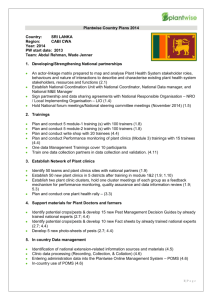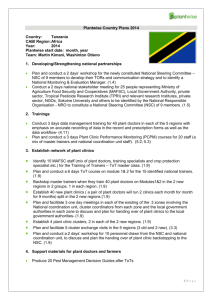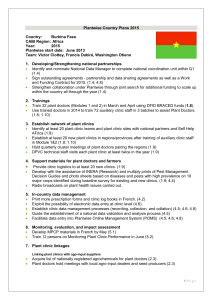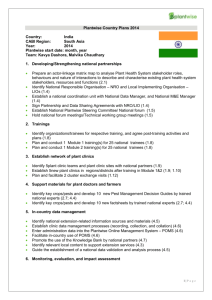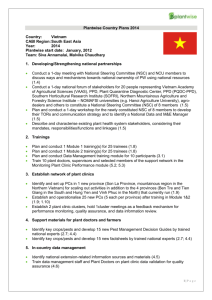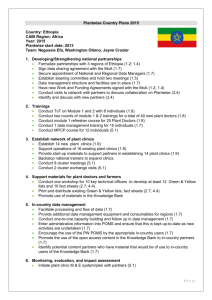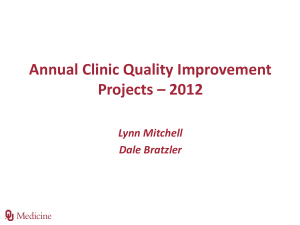Plantwise 2015 activity plan for Rwanda.
advertisement
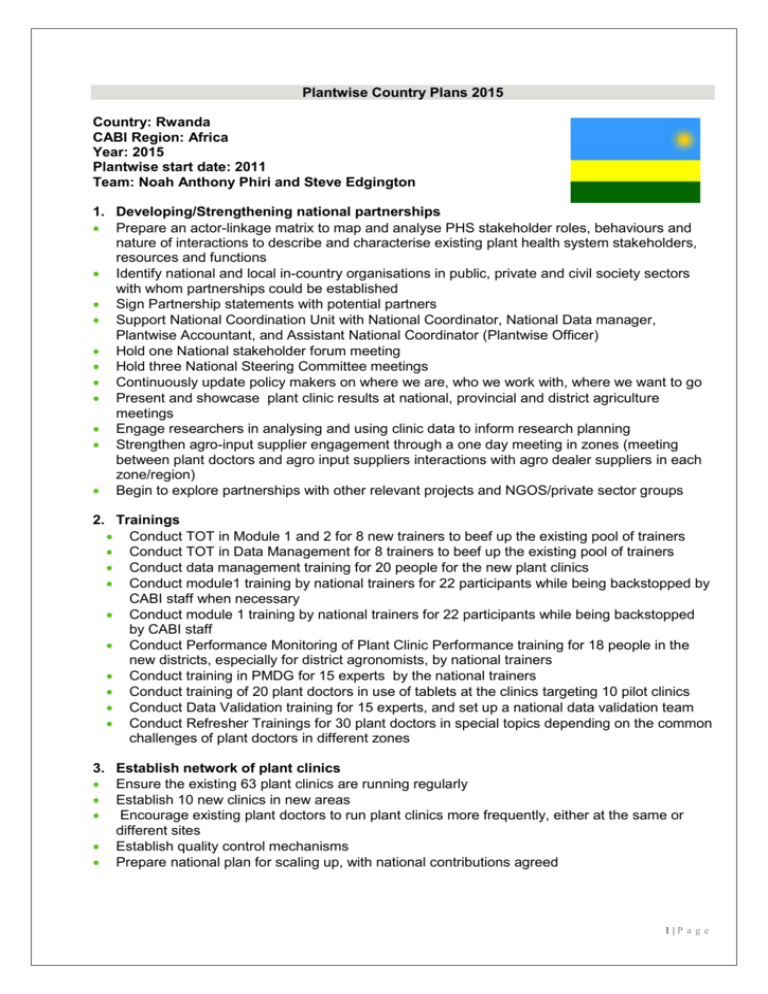
Plantwise Country Plans 2015 Country: Rwanda CABI Region: Africa Year: 2015 Plantwise start date: 2011 Team: Noah Anthony Phiri and Steve Edgington 1. Developing/Strengthening national partnerships Prepare an actor-linkage matrix to map and analyse PHS stakeholder roles, behaviours and nature of interactions to describe and characterise existing plant health system stakeholders, resources and functions Identify national and local in-country organisations in public, private and civil society sectors with whom partnerships could be established Sign Partnership statements with potential partners Support National Coordination Unit with National Coordinator, National Data manager, Plantwise Accountant, and Assistant National Coordinator (Plantwise Officer) Hold one National stakeholder forum meeting Hold three National Steering Committee meetings Continuously update policy makers on where we are, who we work with, where we want to go Present and showcase plant clinic results at national, provincial and district agriculture meetings Engage researchers in analysing and using clinic data to inform research planning Strengthen agro-input supplier engagement through a one day meeting in zones (meeting between plant doctors and agro input suppliers interactions with agro dealer suppliers in each zone/region) Begin to explore partnerships with other relevant projects and NGOS/private sector groups 2. Trainings Conduct TOT in Module 1 and 2 for 8 new trainers to beef up the existing pool of trainers Conduct TOT in Data Management for 8 trainers to beef up the existing pool of trainers Conduct data management training for 20 people for the new plant clinics Conduct module1 training by national trainers for 22 participants while being backstopped by CABI staff when necessary Conduct module 1 training by national trainers for 22 participants while being backstopped by CABI staff Conduct Performance Monitoring of Plant Clinic Performance training for 18 people in the new districts, especially for district agronomists, by national trainers Conduct training in PMDG for 15 experts by the national trainers Conduct training of 20 plant doctors in use of tablets at the clinics targeting 10 pilot clinics Conduct Data Validation training for 15 experts, and set up a national data validation team Conduct Refresher Trainings for 30 plant doctors in special topics depending on the common challenges of plant doctors in different zones 3. Establish network of plant clinics Ensure the existing 63 plant clinics are running regularly Establish 10 new clinics in new areas Encourage existing plant doctors to run plant clinics more frequently, either at the same or different sites Establish quality control mechanisms Prepare national plan for scaling up, with national contributions agreed 1|P a g e Hold 2 cluster and sub-cluster meetings in all the four zones as a feedback mechanism for performance monitoring sharing, quality assurance, and data information review. Plan and facilitate 2 cluster exchange visits 4. Support materials for plant doctors and farmers Identify new potential crops/pests & develop or update Pest Management Decision Guides by already and newly trained national experts Develop 20 photo-sheets of pests Enhance capacity of plant doctors through repeatedly introducing them to the Knowledge Bank Encourage production, validation and publication of extension materials by national experts (with less direct CABI inputs). Explore electronic methods of sharing reference materials with plant doctors 5. 6. In-country data management Review, and revise if necessary, national data management structures, processes and roles Provide backstopping to get data flowing smoothly from all plant clinics Provide backstopping, and training on data validation Promote use of clinic data and POMS through backstopping on data analysis and ensure analysed data is fed back to all stakeholders Pilot use of tablets in plant clinics (only in 10 pilot clinics) Identify national extension-related plant health information sources and materials; Clinic data processing (Recording, Collection, & Collation) Facilitate entering data into the POMS by the national coordination office Promotion of the KB Establishing a National Data Validation and Analysis process Promote sharing among and use of data by national partners Monitoring, evaluation, and impact assessment Identify personnel to be conducting plant clinic monitoring; Review and agree monitoring plans with national partners; Share results of monitoring shared with relevant stakeholders and use in decision making Fully hand over direct plant clinic monitoring to national partners as part of the M&E plan, providing only a backstopping role Conduct further MPCP training for new plant clinic partners and areas Initiate M&E studies in the remaining regions to collect additional feedback on Plantwise programme outcomes and performance 7. Plant clinic linkages Linking plant clinics with agro-input suppliers Review list of nationally registered agrochemicals in case new pesticides have been added or some pesticides have been banned or removed; Develop local directories of agro input suppliers operating in the areas of plant clinics. Hold input suppliers-plant doctor meetings at zone or districts with clinics to exchange information, policies, issues, share PMDGs, fact sheets etc Linking with diagnostic services Assess/evaluate diagnostic labs responses to samples submitted Develop a workflow for the delivery of samples to the labs including financial and administrative issues. Plant health rallies and mass extension campaigns 2|P a g e Plan, provide training for, and conduct 4 plant health rally workshops (one in each zone)/mass extension campaign(s) 8. In-country scaling-up of Plantwise Encourage national partners to scale-up Plantwise activities Develop national scaling-up plans with national partners: through meetings/workshops, to include programme management plans (selection of focal areas, people, facilities etc.) monitoring and evaluation plans, training plans, data management, and programme support plans. 9. Advocacy and public awareness Public awareness Identify best practice for plant clinic publicity and information sharing and way forward Send regular news on Plantwise developments to communication actors and disseminate info through coverage on their channels Capture and share case studies for effective data management Embedding Module 1&2 and PHS approaches in diploma or degree level training Work with the University of Rwanda’s College of Agriculture to review of Modules 1 and 2, and Plant Health Systems which were included in degree and diploma training Explore possibilities of working with secondary schools offering agriculture to initiate the process of inclusion of some components of Modules 1 and 2 in their curriculum 10. Review and planning Hold a national stakeholder forum Hold at least three steering committee meetings to review progress of existing activities and develop/agree the 2016 activity plans against available budget 3|P a g e
